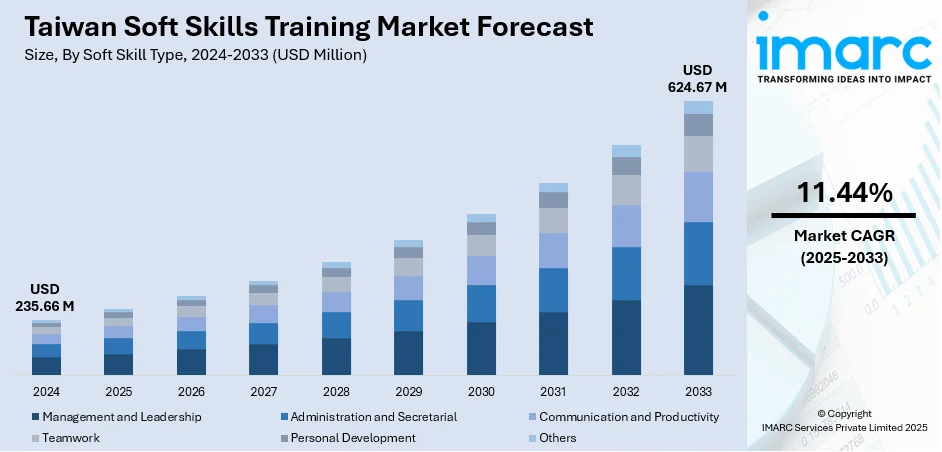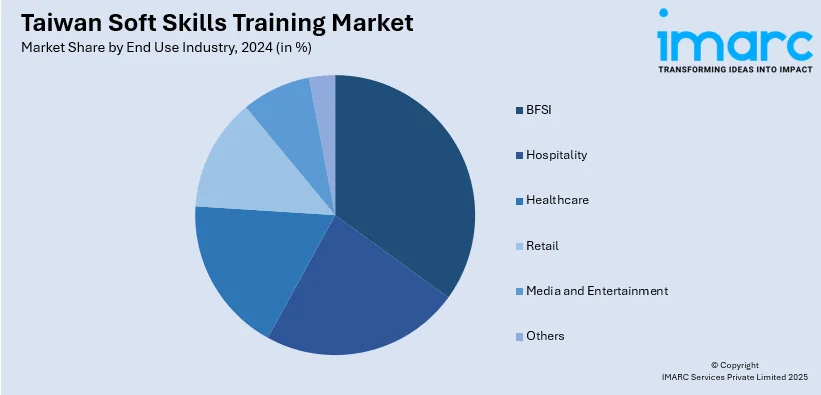
Taiwan Soft Skills Training Market Size, Share, Trends and Forecast by Soft Skill Type, Channel Provider, Sourcing, Delivery Mode, End Use Industry, and Region, 2025-2033
Taiwan Soft Skills Training Market Overview:
The Taiwan soft skills training market size reached USD 235.66 Million in 2024. The market is projected to reach USD 624.67 Million by 2033, exhibiting a growth rate (CAGR) of 11.44% during 2025-2033. At present, with Taiwan moving towards a service-oriented and knowledge-based economy, businesses emphasize hiring individuals capable of effective collaboration, critical thinking, and confident client interaction. Besides this, the growing adoption of artificial intelligence (AI) tools that provide customized learning journeys, immediate feedback, and engaging simulations is contributing to the expansion of the Taiwan soft skills training market share.
|
Report Attribute
|
Key Statistics
|
|---|---|
|
Base Year
|
2024 |
|
Forecast Years
|
2025-2033
|
|
Historical Years
|
2019-2024
|
| Market Size in 2024 | USD 235.66 Million |
| Market Forecast in 2033 | USD 624.67 Million |
| Market Growth Rate 2025-2033 | 11.44% |
Taiwan Soft Skills Training Market Trends:
Thriving service and knowledge sectors
Expansion of the service and knowledge sectors is fueling the market growth. As Taiwan is shifting toward a more service-oriented and knowledge-based economy, companies are prioritizing employees who can collaborate efficiently, think critically, and engage clients confidently. Burgeoning sectors, such as embedded finance, healthcare, information technology (IT) services, education, and customer support, require professionals who not only possess technical skills but also demonstrate emotional intelligence, cultural awareness, and interpersonal abilities. The embedded finance sector in Taiwan is projected to rise by 35.1% yearly, reaching USD 1.63 Billion by 2024. In knowledge-intensive roles, soft skills are essential for managing complex tasks, presenting ideas, and working within diverse teams. Companies are investing in training programs to enhance these competencies and improve overall workforce productivity and client satisfaction. Moreover, as businesses are becoming more global, the ability to engage with international teams and clients is increasing the relevance of cross-cultural communication and leadership development. Universities and vocational institutions are also aligning their curricula with industry needs, offering soft skills modules as part of professional education.

To get more information on this market, Request Sample
Growing adoption of remote and hybrid work arrangements
Rising adoption of remote and hybrid work arrangements is propelling the Taiwan soft skills training market growth. According to industry reports, as of October 2024, leading firms adopted a hybrid work model, with the typical setup in Taiwan consisting of 2 days remote and 3 days onsite. As more organizations are shifting to flexible work models, employees must adapt to new ways of collaborating without face-to-face interaction. This is increasing the importance of skills, such as active listening, virtual teamwork, conflict resolution, and digital presentation. Managers also need training in remote leadership, emotional intelligence, and motivating distributed teams. Without regular in-person interaction, building trust, maintaining engagement, and managing productivity depend heavily on well-developed soft skills. Companies are recognizing that strong interpersonal and communication skills improve efficiency and morale in virtual settings, leading to more spending on soft skills training programs. Additionally, virtual training platforms make it easier to deliver soft skills development at scale. As hybrid work is becoming a long-term trend, the demand for soft skills training continues to grow in Taiwan.
Increasing utilization of AI
Rising use of AI is stimulating the market growth in Taiwan. As AI automates routine and technical tasks, employers are increasingly valuing soft skills that enhance teamwork, leadership, and customer interaction. This leads companies to invest in training programs that build emotional intelligence, adaptability, and decision-making. AI tools are also integrated into training delivery, providing customized learning journeys, immediate feedback, and engaging simulations that make soft skills training more effective. In education and corporate settings, AI-oriented platforms assess learner progress and suggest improvements, supporting continuous development. The need to complement AI with human-centered skills is catalyzing the demand for soft skills across sectors. As Taiwan’s industries continue to employ AI technologies, the importance of human soft skills is rising. Moreover, increasing investments in the AI industry are offering a favorable market outlook. In June 2024, the Executive Yuan set aside an annual budget ranging from NT$9 Billion to NT$10 Billion (USD 304.4 Million to USD 338.3 Million) to promote the development of the country’s AI sector.
Taiwan Soft Skills Training Market Segmentation:
IMARC Group provides an analysis of the key trends in each segment of the market, along with forecasts at the country and regional levels for 2025-2033. Our report has categorized the market based on soft skill type, channel provider, sourcing, delivery mode, and end use industry.
Soft Skill Type Insights:
- Management and Leadership
- Administration and Secretarial
- Communication and Productivity
- Teamwork
- Personal Development
- Others
The report has provided a detailed breakup and analysis of the market based on the soft skill type. This includes management and leadership, administration and secretarial, communication and productivity, teamwork, personal development, and others.
Channel Provider Insights:
- Corporate/Enterprise
- Academic/Education
- Government
A detailed breakup and analysis of the market based on the channel provider have also been provided in the report. This includes corporate/enterprise, academic/education, and government.
Sourcing Insights:
- In-house
- Outsourced
A detailed breakup and analysis of the market based on the sourcing have also been provided in the report. This includes in-house and outsourced.
Delivery Mode Insights:
- Online
- Offline
A detailed breakup and analysis of the market based on the delivery mode have also been provided in the report. This includes online and offline.
End Use Industry Insights:

- BFSI
- Hospitality
- Healthcare
- Retail
- Media and Entertainment
- Others
A detailed breakup and analysis of the market based on the end use industry have also been provided in the report. This includes BFSI, hospitality, healthcare, retail, media and entertainment, and others.
Regional Insights:
- Northern Taiwan
- Central Taiwan
- Southern Taiwan
- Eastern Taiwan
The report has also provided a comprehensive analysis of all the major regional markets, which include Northern Taiwan, Central Taiwan, Southern Taiwan, and Eastern Taiwan.
Competitive Landscape:
The market research report has also provided a comprehensive analysis of the competitive landscape. Competitive analysis such as market structure, key player positioning, top winning strategies, competitive dashboard, and company evaluation quadrant has been covered in the report. Also, detailed profiles of all major companies have been provided.
Taiwan Soft Skills Training Market Report Coverage:
| Report Features | Details |
|---|---|
| Base Year of the Analysis | 2024 |
| Historical Period | 2019-2024 |
| Forecast Period | 2025-2033 |
| Units | Million USD |
| Scope of the Report |
Exploration of Historical Trends and Market Outlook, Industry Catalysts and Challenges, Segment-Wise Historical and Future Market Assessment:
|
| Soft Skill Types Covered | Management and Leadership, Administration and Secretarial, Communication and Productivity, Teamwork, Personal Development, Others |
| Channel Providers Covered | Corporate/ Enterprise, Academic/ Education, Government |
| Sourcings Covered | In-house, Outsourced |
| Delivery Modes Covered | Online, Offline |
| End Use Industries Covered | BFSI, Hospitality, Healthcare, Retail, Media and Entertainment, Others |
| Regions Covered | Northern Taiwan, Central Taiwan, Southern Taiwan, Eastern Taiwan |
| Customization Scope | 10% Free Customization |
| Post-Sale Analyst Support | 10-12 Weeks |
| Delivery Format | PDF and Excel through Email (We can also provide the editable version of the report in PPT/Word format on special request) |
Key Questions Answered in This Report:
- How has the Taiwan soft skills training market performed so far and how will it perform in the coming years?
- What is the breakup of the Taiwan soft skills training market on the basis of soft skill type?
- What is the breakup of the Taiwan soft skills training market on the basis of channel provider?
- What is the breakup of the Taiwan soft skills training market on the basis of sourcing?
- What is the breakup of the Taiwan soft skills training market on the basis of delivery mode?
- What is the breakup of the Taiwan soft skills training market on the basis of end use industry?
- What is the breakup of the Taiwan soft skills training market on the basis of region?
- What are the various stages in the value chain of the Taiwan soft skills training market?
- What are the key driving factors and challenges in the Taiwan soft skills training market?
- What is the structure of the Taiwan soft skills training market and who are the key players?
- What is the degree of competition in the Taiwan soft skills training market?
Key Benefits for Stakeholders:
- IMARC’s industry report offers a comprehensive quantitative analysis of various market segments, historical and current market trends, market forecasts, and dynamics of the Taiwan soft skills training market from 2019-2033.
- The research report provides the latest information on the market drivers, challenges, and opportunities in the Taiwan soft skills training market.
- Porter's five forces analysis assist stakeholders in assessing the impact of new entrants, competitive rivalry, supplier power, buyer power, and the threat of substitution. It helps stakeholders to analyze the level of competition within the Taiwan soft skills training industry and its attractiveness.
- Competitive landscape allows stakeholders to understand their competitive environment and provides an insight into the current positions of key players in the market.
Need more help?
- Speak to our experienced analysts for insights on the current market scenarios.
- Include additional segments and countries to customize the report as per your requirement.
- Gain an unparalleled competitive advantage in your domain by understanding how to utilize the report and positively impacting your operations and revenue.
- For further assistance, please connect with our analysts.
 Request Customization
Request Customization
 Speak to an Analyst
Speak to an Analyst
 Request Brochure
Request Brochure
 Inquire Before Buying
Inquire Before Buying




.webp)




.webp)












